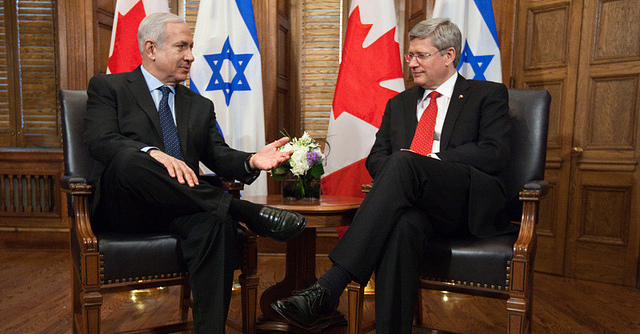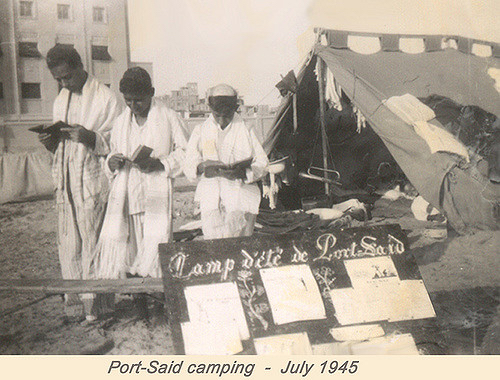No one was surprised when Canada lost to Portugal for a seat at the Security Council in October 2010. Rumour had it that it was a direct result of a new pro-Israeli foreign policy being spearheaded by Prime Minister Stephen Harper. We may never know if this is true or not, but it’s undeniable that Canada’s shift towards an increasingly uncritical support for Israel has deeply affected its international standing.
First, some history. Canada has never exactly been “pro-Palestinian.” This has been true since Lester B. Pearson served as chairman of the General Assembly’s Special Committee on Palestine, and helped draft the 1947 partition plan.
Canada has historically prided itself on being an “honest broker” on the conflict. Forum Research made this clear in May when it released a poll that showed that, from a sample of 1694 people, 17% leaned towards Israel, 16% toward Palestine, and an overwhelming 64% leaned to neither side. Canadians favour an approach that maintains as much diplomatic neutrality as possible. Until Harper entered office, their government agreed with them.
Since his election in 2006, after an unexpected collapse of Liberal Party support following the sponsorship scandal, Stephen Harper has transformed Canada into one of the most pro-Israel (and specifically pro-Likud) countries in the world, making even the Americans, at times, blush. Former Canadian UN Ambassador Paul Heinbecker went as far to condemn it as a “one-eyed foreign policy that sees Israeli virtues and turns a blind eye to Israeli transgressions and Palestinian suffering and rights.” Harper’s support for Israel began immediately. Two days after he won a minority government in January 2006, Hamas won legislative elections in Gaza. Canada became the first country after Israel to cut off assistance to the Palestinian Authority.
Domestically, Canada’s support for the Israeli government has become far more noticeable over time. Canada cut funding to KAIROS in 2009 for being too “pro-Palestinian,” and at the 2011 G8 summit, Harper refused to endorse Obama’s middling peace plan that was based on 1967 borders. Most recently, in July, Harper went as far to blame Hamas for Palestinian casualties inflicted by the Israeli shelling of a UN shelter in Gaza. The logic was contradictory, and of course, calculated. Still, this was one of the most hardline responses by any world leader.
For the majority of Canadians who disagree with official policy, these moves have come out of left field. However, it is entirely in line with Harper’s long-established conservative views. We need to go back to April 2003 to understand the foundations of current federal policy. Harper, then a laughingstock as the leader of the Canadian Alliance, gave a speech to the right-wing Civitas Group that illuminated many of his ideological motivations. Harper said that Canada needs to “rediscover Burkean conservatism because the emerging debates on foreign affairs should be fought on moral grounds.” For Harper, the “modern left” and its concept of “moral neutrality” has to be met by a conservatism that understands “the notion that moral rules form a chain of right and duty, and that politics is a moral affair.”
The premier went on to say that the post-9/11 era would be defined by “battles over values,” and called for Canadian conservatism to “take the moral stand, with our allies, in favour of the fundamental values of our society, including democracy, free enterprise, and individual freedom.” Many of these statements closely parallel American neoconservative ideology, in a George W. Bush-inspired sense. In keeping with this hackneyed anti-intellectualism, the notion that some issues are too complex to even think about, “taking sides” registers as an expression of moral weakness. Stephen Harper’s response is to be counter it with an Evangelical zeal for ‘Western’ values and heavy-handed rhetoric about national security.
There are many reasons why the Canadian head of government expresses his support for Israel so enthusiastically. They include an obvious eagerness to please wealthy and influential Zionist supporters in Southwestern Ontario, a trend of Christian Zionism in his native Alberta, and what is likely a genuine friendship with senior members of Israel’s governing Likud Party. Again, comparisons with the constellation of US-style influences is helpful, in understanding Harper’s behavior. It’s a potent contemporary mix, with deep roots in Canada’s history as a colonial-settler society, that is as politically native to Canadian politics as it is to the US, despite America’s significantly longer history of supporting Israel.
Still, it’s important not to over-emphasise Israel’s importance. Harper didn’t simply propose a different approach to it when he gave his Civitas speech. He was outlining an overhaul in Canadian politics, in which Israel plays a significant, but not exclusive, ideological part.
Though we are seeing a particular application of this politics in the Middle East, specifically its principles of violent moralism at the expense of rational diplomacy, they can and are easily applied domestically, in Canada, as well. The debate about the tar sands, for example, is certainly tinged with these values, especially when it comes to extensive spying on environmentalist groups and a total disregard for indigenous rights.
Hence, Israel-Palestine being just one part of Canada’s growing conservative revolution. Even with opposition from Canadians on many issues, it is unknown where exactly it will lead. Given the direction of American and British politics, at present, it’s hard to be optimistic.
Photograph courtesy of Stephen Harper. Published under a Creative Commons License.





